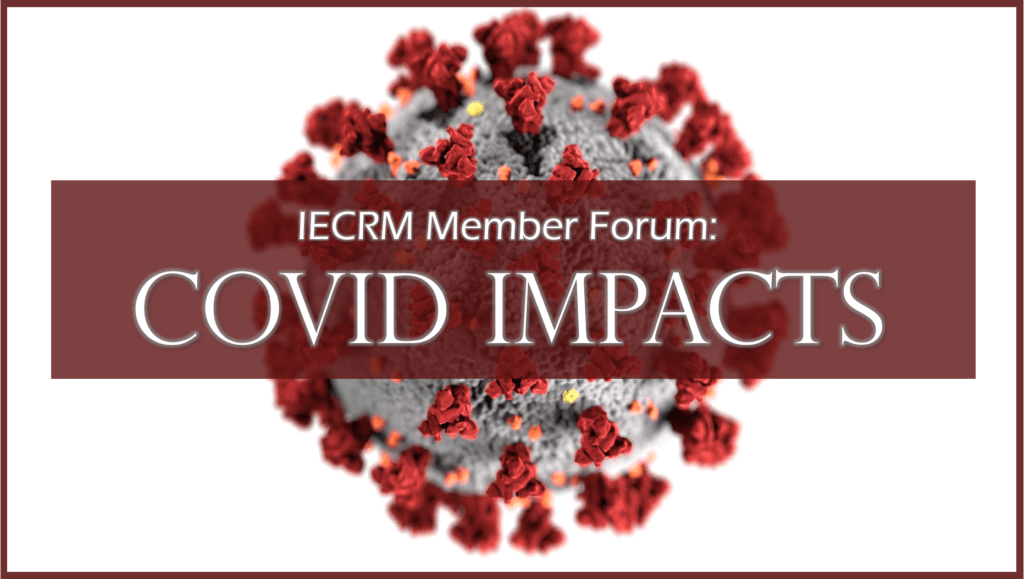Wednesday, April 15, 2020
New OSHA record keeping requirements and relaxed CDC guidance for critical infrastructure workers was the main topic of the IECRM Member Forum along with the critical impact of the COVID-19 crisis on electrical inspectors and their ability to conduct building inspections.
Today’s subject matter experts included:
- Brian Kelly, IECRM Instructor; Chair for IECRM/NECA Inspector Meetings; IAEi Board Member; and Building Inspection Supervisor for Commerce City
- Kristin White, Attorney at Law and Partner, Fisher & Phillips; experts in workplace safety matters and employment law
The Forum also served the purpose of exploring questions to send to DORA about inspection and licensure challenges in the midst of COVID-19.
New OSHA Guidance
- The Occupational Safety and Health Administration (OSHA), which is part of DOL, said in guidance released on Friday (April 13) that most employers will not be required to investigate COVID-19 cases to determine whether they are work-related, as they are obligated to do with other illnesses and injuries.
- Under OSHA’s recordkeeping requirements, COVID-19 is a recordable illness, and employers are responsible for recording cases of COVID-19, if: (1) the case is a confirmed case of COVID-19, as defined by Centers for Disease Control and Prevention (CDC); (2) the case is work-related, and (3) the case involves one or more of the general recording criteria for injury or illness as well as days away from work.
- To meet these criteria, evidence collected needs to be objective.
- Create work logs
- Know who is working with whom and what they are doing
- Be prepared to provide OSHA inspectors with a record of the who, what, when, where and why.
- Document the steps you are taking in the workplace to prevent COVID-19 exposure
- Disinfect areas daily
- Provide stations in the workplace to promote frequent and thorough hand washing; hand sanitizers
- Maintain social distance
- Encourage proper respiratory etiquette (covering mouth/nose when sneezing or coughing)
- Limit the number of workers at a site
- Encourage sick workers to stay home
- If possible, provide options for working remotely (i.e. telecommuting, flexible work hours, staggered shifts)
New CDC Guidance
- The CDC has issued new guidelines saying it is OK for essential employees to keep working after potential exposure to COVID-19 if certain conditions are met.
- Essential workers who may have been exposed may continue to work, provided they are asymptomatic, wear a mask at all times for 14 days after their last exposure and have their temperature taken each time before entering the workplace.
- The guidance on temperatures is if 100.4 or above, send the worker home.
- Previously, those workers were told to quarantine at home for two weeks.
- Also includes updated guidance on:
- Cleaning and disinfection
- Best practices for conducting social distancing
- Strategies and recommendations for COVID-19 response
- Keep up with CDC updates on Coronavirus Disease 2019 by signing up for email updates, syndicating available content, and subscribing to Coronavirus Disease 2019 RSS Feed.
Impact on Building Inspections
- We are experiencing a new normal
- Inspectors are all working from home and are not allowed to enter offices during certain times of day
- Temperatures are being taken regularly
- In the field, inspectors are wearing gloves and masks
- Despite that, inspections are still being conducted.
- Areas to be inspected should be cleared of workers at the point of inspection and required signage must be posted certifying that the building is clear.
- Inspections are being conducted from the outside of structures where possible.
- Indoor inspections are discouraged.
- Inspectors have the right to turn down an inspection.
- Stress in the workplace is a factor; keeping inspectors motivated is difficult; worry is considerable because they note that other workers are staying at home.
- Some inspections are migrating to online.
- The International Code Council (ICC) has resources available.
- Alternative approaches include a review of photographic/video materials and/or the use of live streaming applications like Skype, Facetime, or Zoom.
- There may be a move to conduct online inspections statewide.
- Conducting electrical inspections by video is very hard to do. Being 100% certain that everything works correctly and is up to code is required to pass an inspection.
- Colorado has mandated a policy be developed before virtual inspections become the norm. What are the challenges? What are the blocks?
- It was noted that Arizona, Arlington VA, and Shelby TN, for example, have been conducting virtual inspections for several years now.
- Some inspection organizations are hiring third-party services to keep moving jobs forward. Some contractors are willing to pay a premium to keep inspections moving along.
- Some have stopped inspections through August. There is worry about slowdowns in industries.
- As always, AHJs can vary.
- To stay engaged with inspection perspectives in the midst of COVID-19, join the IECRM/NECA monthly meetings. Contractors are invited to attend. (add link to info about these monthly meetings)
- So far, there have not been any changes to DORA’s website about licensure testing or CEU extensions.
- Is DORA considering conducting online, virtual, digital inspections? What will the requirements and expectations be for inspectors and for contractors?
- Will Colorado consider waiving requirements for licensure in light of the considerable disruption by COVID-19?
- What will be involved in terms of submitting renewal applications and paying required fees?
- Will there be an online testing option?
NOTE TO CONTRACTORS: What additional questions do you have? IECRM will compile the questions to submit for answer by DORA. Please email your questions to
[email protected].

